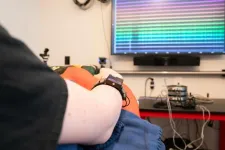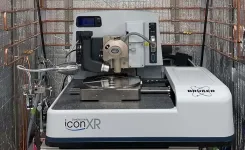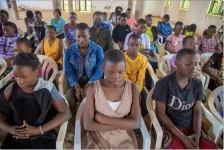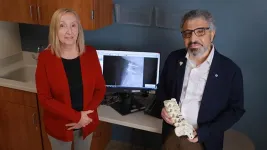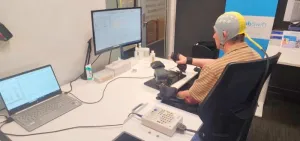(Press-News.org) PITTSBURGH - As part of a larger commitment to developing equitable technology, Carnegie Mellon University and Meta announce a collaborative project to make computer-based tasks accessible to more people. This project focuses on using wearable sensing technology to enable people with different motor abilities to perform everyday tasks and enjoy gaming in digital and mixed reality environments.
Meta’s research in electromyography uses sensors placed on the skin to measure the electrical signals the user generates through muscles in their wrist, which are translated into input signals for various devices. While Meta has already demonstrated that this technology could replace keyboards and joysticks, the team continues to invest and support different projects to confirm that this technology can be used by a wide range of people.
Douglas Weber, a professor in the Department of Mechanical Engineering and the Neuroscience Institute at Carnegie Mellon University, has shown previously that people with complete hand paralysis retain the ability to control muscles in their forearm, even muscles that are too weak to produce movement. His team found that some individuals with spinal cord injury still exhibit unique muscle activity patterns when attempting to move specific fingers, which could be used for human computer interactions.
“This research evaluates bypassing physical motion and relying instead on muscle signals. If successful, this approach could make computers and other digital devices more accessible for people with physical disabilities,” said Weber.
Working with Meta, Weber’s team seeks to build upon their initial results to assess whether and to what extent people with spinal cord injury can interact with digital devices, such as computers and mixed reality systems by using Meta’s surface electromyography (sEMG) research prototype and related software.
The project centers on interactive computing tasks. Approved by the Institutional Review Board, study participants begin by performing a series of adaptive mini games. Once their proficiency is benchmarked, the CMU team creates new games and other activities in mixed reality that are tailored to the abilities and interests of the participant.
“In the digital world, people with full or limited physical ability can be empowered to act virtually, using signals from their motor system,” explained Dailyn Despradel Rumaldo, PhD candidate at Carnegie Mellon University. “In the case of mixed reality technology, we are creating simulated environments where users interact with objects and other users, regardless of motor abilities.”
The project comes as an ongoing research investment by Meta to support the development of equitable and accessible interfaces to help people do more, together.
###
About the College of Engineering: The College of Engineering at Carnegie Mellon University is a top-ranked, engineering college that is known for our intentional focus on cross-disciplinary collaboration in research. The College is well known for working on problems of both scientific and practical importance. Our acclaimed faculty have a focus on innovation management and engineering to yield transformative results that will drive the intellectual and economic vitality of our community, nation and world. The College offers graduate and undergraduate degree programs in biomedical engineering, chemical engineering, civil and environmental engineering, electrical and computer engineering, engineering and public policy, information networking, materials science and engineering and mechanical engineering. Our “maker” culture is ingrained in all that we do, leading to novel approaches and transformative results.
END
Silicon computer chips have served us well for more than half a century. The tiniest features on chips currently sold are approximately 3 nanometers — a startlingly small size given that a human hair is roughly 80,000 nanometers wide. Reducing the size of features on chips will help us meet our endless need for more memory and processing power in the palm of our hand. But the limit of what can be achieved with standard materials and processes is near.
Researchers at the U.S. Department of Energy’s (DOE) Princeton Plasma Physics Laboratory (PPPL) are applying their expertise in ...
Ice in nature is surrounded by liquid most of the time, and therefore it is key to understand how ice and liquid interact. A Kobe University and Institute for Molecular Science study could now for the first time directly observe the precise shape of ice at the interface between ice and liquid – by using antifreeze and a refrigerated microscope.
When we slide on ice, when snowflakes form, when we lick ice cream, the surface of the ice is always covered with liquid water, and understanding the interaction between the ...
The United States has lost its only stand of the massive Key Largo tree cactus in what researchers believe is the first local extinction of a species caused by sea level rise in the country.
The Key Largo tree cactus (Pilosocereus millspaughii) still grows on a few scattered islands in the Caribbean, including northern Cuba and parts of the Bahamas. In the United States, it was restricted to a single population in the Florida Keys, first discovered in 1992 and monitored intermittently since.
Salt water intrusion from rising seas, soil depletion from hurricanes and high tides, and herbivory by mammals had put significant pressure ...
A peer-reviewed study published today in Health Care for Women International found that the Transcendental Meditation® (TM®) technique can empower the lives of female youth living under conditions of poverty in the city slums of Kampala, Uganda. Outcomes include increased self-esteem, self-efficacy, and gratitude; and decreased tiredness, worry, and excessive alcohol use. TM helped these young women improve their mental and physical health, as well as their relations with family and community members.
“The ...
The National Foundation for Cancer Research (NFCR) proudly announces the promotion of Brian Wachtel to Chief Development Officer. Brian will continue his responsibilities as the Executive Director, and his expanded role will further enhance his leadership within the organization.
Brian joined the National Foundation for Cancer Research in September 2016 as the Director of Corporate Partnerships & Special Events. In that capacity, he was in charge of organizing and expanding NFCR’s community outreach events. One of his important ...
Adolescents worldwide have embraced social media and online platforms for self-expression and to explore their identity. This freedom, however, can lead to risky behaviors, especially with limited adult supervision. For example, digital self-harm is a recent, emerging trend where individuals anonymously post or share hurtful content about themselves online. This behavior can be mistaken for mistreatment by others, yet the perpetrator and victim are the same person.
First identified in 2010, digital self-harm has not received the same amount of scholarly scrutiny as other forms of self-directed abuse and has not been widely addressed by adults ...
The University of Texas at San Antonio (UTSA) has joined one of two newly established university consortia committed to nuclear security and nonproliferation. The consortia were awarded $50 million in cooperative agreements by the Office of Defense Nuclear Nonproliferation in the U.S. Department of Energy’s National Nuclear Security Administration (DOE NNSA).
“The pressing challenges of nuclear security and nonproliferation require a concerted effort from experts across the country,” said JoAnn Browning, UTSA interim vice president for research. ...
A new study from orthopaedic researchers at The University of Toledo has found lumbar spinal fusion procedures are far more likely to fail in individuals with diabetes.
“We’ve known for a long time that diabetic patients are at high risk of infection from any surgery, including spinal fusion,” said Dr. Hossein Elgafy, a professor of orthopaedics in the College of Medicine and Life Sciences and chief of spine surgery at UTMC. “More recently, however, physicians have taken a closer look at the high ...
A personalized brain-computer interface therapy, RehabSwift, significantly enhances hand mobility for stroke survivors. Strokes often lead to impaired hand function, presenting substantial challenges in daily activities. Sam Darvishi and colleagues developed and tested a brain-computer interface therapy that translates imagined hand movements into real actions using a personalized algorithm and bionic hands. The study involved twelve chronic stroke survivors from South Australia who had limited use of their arms but retained clear thinking abilities. Throughout 18 sessions, participants used the RehabSwift system, which included a special cap that ...
MILL VALLEY, Calif. – July 9, 2024 – SynGAP Research Fund (SRF), a 501(c)(3) public charity whose mission is to improve the quality of life for patients suffering from SYNGAP1-Related Disorders (SRD) through the research and development of treatments, therapies, and support systems, has awarded a $130,000 grant to the University of Southern California’s Quadrato Lab to inspect and stratify the effects of specific SYNGAP1 variants on their patient-derived neuronal model system, furthering the world’s understanding ...
